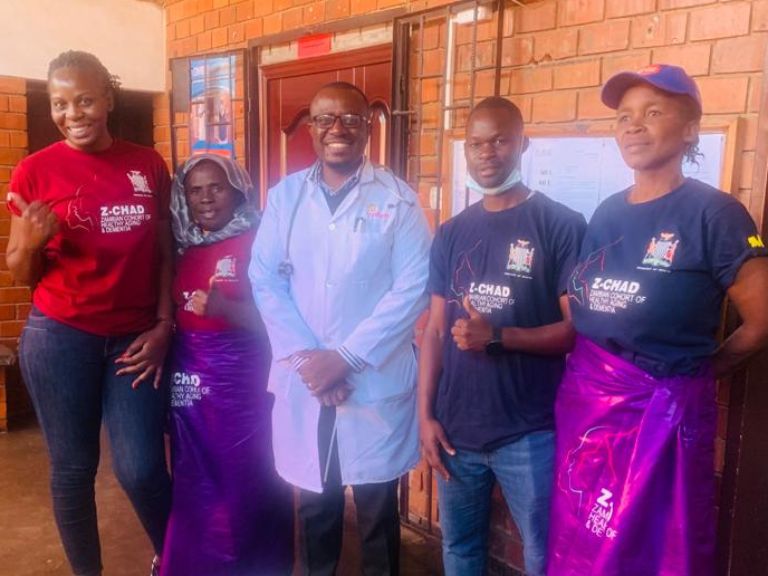From the CAPRA Quarterly Winter 2024:
FEATURED CAPRA PILOT AWARDEE
Melissa Elafros, MD, PhD

The CAPRA Pilot Core, led by University of Michigan faculty Edward Norton and Deborah Levine, aims to fund innovative pilot projects in AD/ADRD aligned with CAPRA’s themes of Alzheimer’s research at the population level.
Featured in this newsletter is the research of CAPRA Pilot Awardee, Melissa Elafros, MD, PhD, the Andrea and Lawrence A. Wolfe Research Professor and Assistant Professor of Neurology at the University of Michigan.
Pilot Award Title
Zambian Cohort of Healthy Aging and Dementia Study
Scientific Premise
In sub-Saharan Africa, risk factors for cognitive impairment include traditional cardiovascular and metabolic causes as well as undernutrition and HIV. Characterizing the burden of AD/ADRD, associated risk factors, and community understanding of these diseases is key to design interventions to improve outcomes.
Gaps in Knowledge
There is virtually no population-based data regarding the prevalence of AD/ADRD and associated risk factors in Zambia. Misconceptions regarding these diseases may hinder the provision of care and quality of life for patients and their caregivers, though this is unknown.
Study Aims
- Quantify cognitive impairment prevalence in a population-based household survey of 400 adults >55 years and their caregivers in Lusaka
- Validate findings from the household survey and define dementia subtypes using a nested-case control study of 200 participant/caregiver pairs
- Characterize local understanding of AD/ADRD and the burden of caregiving for AD/ADRD in Zambia
What drew you to the field of AD/ADRD research?
Dementia is an under-recognized, under-treated condition in many resource-limited settings like Zambia. Dementia symptoms are associated with significant misconceptions, like witchcraft, and caring for patients with dementia falls entirely to family members. Addressing this burden by identifying affected patients and offering low-cost interventions and support to family members is what drove me and my collaborators to pursue this research.
What is the most compelling research finding from your CAPRA Pilot proposal?
We haven’t completed our data collection and yet have already had so many compelling findings! In six months, our team of community healthcare workers (CHWs) has visited over 1,400 households and enrolled 200 adults over the age of 55 and their family members in two low-income communities in Lusaka. We’ve learned about participant’s economic, social, and medical risk factors for dementia. We’ve also learned that CHWs with limited background in dementia can appropriately administer validated cognitive screening measures. As we anticipated, community understanding of dementia and cognitive impairment is limited. 78% thought dementia develops suddenly and 68% thought people with dementia were crazy. 42% said people with dementia were violent and should be avoided. This has a substantial impact on how people with dementia and their family members are treated by the community. Most surprisingly, we have found that 53% of our participants screened positive for probable dementia and are under further investigation.
What is the most interesting open question to you about AD/ADRD research?
There is a significant lack of data regarding the prevalence and risk factors for dementia in sub-Saharan Africa. While this may seem extremely basic, there is no hope of achieving global health equity in dementia unless this gap is addressed. Providing this data will help design interventions for people at risk for AD/ADRD and support programs for their caregivers.

CAPRA is a federally funded P30 Research Center based at the University of Michigan with a focus on science that informs government and healthcare organization actions to address the negative impacts of dementia on the health and financial wellbeing of individuals and the population. CAPRA has four interrelated themes: (1) healthcare delivery and policy impact on outcomes and quality of care for persons with dementia; (2) diffusion of new technologies; (3) disparities in quality and access to care; and (4) innovative applications of population data that inform the allocation of resources and program development. Additionally, CAPRA provides an “on-ramp” for early and established investigators in the field of Alzheimer's Disease and Alzheimer's Disease Related Dementias (AD/ADRD) by providing access to established investigators in the field, pilot funding, and methods and tools specific to AD/ADRD for secondarily analysis of data sets. The research that emanates from CAPRA will have real world implications for payers and policymakers as they struggle with designing effective policies to improve outcomes for the growing population with or at risk for AD/ADRD. The CAPRA P30 Research Center and related activities are made possible by the National Institutes of Health (NIH), National Institute on Aging (NIA) award P30AG066582.
